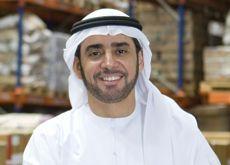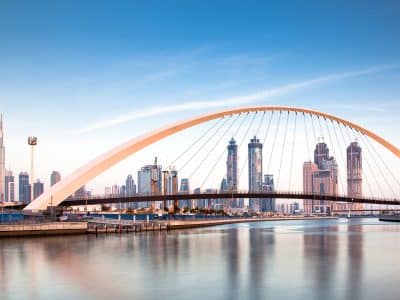We take a look at companies where a climate controlled environment has effectively increased worker efficiency and morale, while decreasing on-the-job accidents.
Global Shipping and Logistics (GSL) – Khalid AL Shirawai, Executive Director
What type of temperature-controlled storage is offered by your company?
Global Shipping & Logistics (GSL) is one of the few service providers to offer storage from -25ºC to 25ºC within a single location. Additionally, we offer temperature-controlled and cold storage from the same location.
What products need temperature control?
Customers who are either manufacturers or distributors of international and local brands are our primary customers. We are focused on chocolates, snack foods, drinks, jams and preserves in the temperature controlled area. In the cold store, we are focused on ice creams, frozen meats, ready-to-cook food, poultry and seafood.
What are the challenges involved with temperature-controlled storage?
The biggest challenge is maintaining the right temperature at all times from off-loading the cargo till storage and shipping. As the UAE has extreme temperatures, there is a challenge in not allowing the outside temperature to have an effect on the goods during off-loading and shipping. At GSL, we have answered this requirement by having dock levellers and shelters that are inflatable and cover the rear of the container during off-loading and shipping of goods. Implementation of a SCADA (Supervisory Control and Data Acquisition) system to monitor and control the chiller and plant is a definite advantage in maintaining the temperature and humidity requirements, as well as offering our customers a comfort level in knowing that their items are handled and stored correctly.
How strong is demand for temperature- controlled storage in the Middle East?
Temperature-controlled storage is a major requirement in the Middle East. The challenge is to find the right partner who will do it. This is based specifically on the challenges mentioned above.
Do you believe there is a sufficient supply of logistics companies that service this region, as well as market?
There are enough companies offering temperature controlled storage from a capacity perspective. However, the quality and process systems with most of them are not up to international standards. There is definitely scope for improvement for many service providers in adopting international systems and infrastructure. The addition of stringent quality processes is also a necessary tool to ensure compliance.
What makes your company different to others that provide this service?
GSL has invested in best-in-class infrastructure and systems, while our processes are tailor-made for the temperature controlled and frozen business. We differentiate ourselves from other service providers by offering services customised to both the specific client and item handling/storage requirements. Starting from the system integration to the storage and handling of the goods, GSL provides complete control and visibility to customers. We are proud to say that we have never lost a customer due to service issues.
Do you have plans to develop your temperature controlled storage in the future?
There are plans to develop this further in 2011 as part of our Phase 3 project within DIP.
Al Madina Logistics – Sanjeeve Thavarajah, Senior Manager, Supply Chain Divison
What type of temperature-controlled storage is offered by your company?
We provide our customers with a combination of freezer chambers, chiller chambers, air-conditioned, ambient and ambient storage.
What products need temperature control?
Typical examples include fast moving consumer goods (FMCG), as well as white and brown goods.
What are the challenges involved with temperature-controlled storage?
Within cold chain management, our challenge remains operating a low energy facility that is compliant with LEED.
How strong is demand for temperature-controlled storage in the Middle East?
Demand is very good and we record an all-time peak in the summer months.
Do you believe there is a sufficient supply of logistics companies that service this region, as well as market?
I think we have quite a broad range of logistics providers here operating on conventional methods of storage and handling system. We need to see more taking the initiative to move on to technology-driven applications for storage and handling systems to be able to operate at a low cost, thus passing this savings on to our clients.
What makes your company different to others that provide this service?
For starters, our facility is designed based on LEED and BREAM guidelines. This is one of its kind in the Sultanate of Oman, as well as the region. The benefit to having a low energy consuming facility is the ability to operate at the lowest possible costs, thus enabling us to price our rates competitively. Besides the low energy factor, we also comply strictly with cold chain management guidelines. This assures the client that product quality is maintained and product deterioration is also minimised.
Al-Futtaim Logistics – Tom Nauwelaerts, Head of Logistics
What type of temperature-controlled storage is offered by your company?
Al-Futtaim Logistics offers a self-contained cold storage facility in Jebel Ali Free Zone, with the capacity to run at temperatures of 22ºC throughout the year. In addition, our new parts distribution centre for Toyota is temperature controlled. Working in temperature- controlled environments is much more convenient for the involved staff and we have seen huge increases of productivity, especially during the warmer part of the year.
What products need temperature control?
Within our facilities, we are holding a large variety of products. Amongst others, we are holding consumer goods from the beauty sector, together with electronic hardware containing components that are sensitive to high-levels of humidity and changes in temperature. We also store hanging garments for clothing retailers within Al-Futtaim.
What are the challenges involved with temperature-controlled storage?
High energy costs remain an important consideration, and to keep these costs to a minimum it is important to ensure that the facility has very good insulation and protection against leakage. Of course, back-up systems are also critical in the case of a potential electrical supply failure. When appropriate, the use of VNA (very narrow aisle) or mobile racking systems will ensure optimum storage density, thus minimising storage and energy costs per pallet or unit.
How strong is demand for temperature- controlled storage in the Middle East?
Clearly with the climate in this region, it is critical to many businesses. There are many product sectors that would not require temperature controlled facilities in many areas of the world, but that do require it in this region due to the severe fluctuations in temperature and humidity.
Do you believe there is a sufficient supply of logistics companies that service this region, as well as market?
Cool storage is reasonably abundant, however there are very few companies in the 3PL market offering storage for frozen goods, predominantly food, and therefore companies whose core business is in the frozen sector have a limited choice of service providers.
What makes your company different to others that provide this service?
What distinguishes us from the competition is that we can offer cool storage in different types of warehousing, from basic infrastructure to very high-end state of the art infrastructure, like our part distribution centre in Dubai Industrial Park. We have the resources to ensure the satisfaction of customers.
Do you have plans to develop your temperature controlled storage in the future?
Definitely. Our infrastructure plans are aimed at growing our portfolio of services and client base, for both Al-Futtaim group clients and also external 3PL customers, and would be incomplete without the ability to address the needs of many important market segments requiring such facilities. As mentioned earlier, we have seen dramatic increases of productivity in our temperature controlled warehousing, so we strongly believe that this will be the new norm for the established Service providers who operate at the higher end of the customer range. Upgrading of the building infrastructure, the use of more technology and automation, and a more human friendly working environment, is seen by us as instrumental in reaching higher productivity and efficiency levels in our Warehousing operations. That way we can take Warehousing to another level in this region.
GAC – Phil Showering, General Manager of Logistics Services, Dubai
What type of temperature-controlled storage is offered by your company?
Understanding the transportation, handling and storage challenges of perishables, maintaining their temperature integrity is a top priority at GAC. Our flagship distribution centre GAC Logistics Park at Jebel Ali Free Zone houses a dedicated cold chain facility which utilises sophisticated technology for cold chain maintenance and automation for product handling. GAC’s road transportation network, supported by its fleet of vehicles featuring temperature-controlled and dual compartments refrigeration, also ensures a seamless transportation for perishable items.
What products need temperature control?
GAC houses a number of perishable commodities within our distribution centre network, which span a range of particular temperature sensitive bands from pharmaceuticals, where we have vaccines and healthcare products that must not be exposed to temperatures above 8°C, to traditional frozen operations that are maintained at -30°C to ensure the freshness of the product.
What are the challenges involved with temperature-controlled storage?
Chilled and frozen food must be managed, stored and transported within specific temperature ranges to ensure that optimum product viability or freshness is preserved and that safe and high quality product is delivered to the customers. Climate plays a crucial role in the Middle East, placing unique demands on temperature-sensitive goods and calling for special training and equipment. Chilled food particularly, are more vulnerable to spoilage through temperature variations, resulting in a much shorter shelf life. For example it is very important to our FMCG customers that there products do not rise above 18ºC in general, as this is when the likes of commodities such as perfumes or cosmetics can start to deteriorate, and will subsequently shorten the effective life of the product.
How strong is the demand for temperature- controlled storage in the Middle East?
Demand for temperature-controlled storage – especially quality ones – is strong, as the importance of seamless links along the supply chain is heightened in the Middle East, due to the harsh climate. This is driven by regional consumption of the commodities as well as re-distribution to nearby markets.
Do you believe there is a sufficient supply of logistics companies that service this region, as well as market?
Within Dubai, there are a sufficient supply of logistics companies, with all the global players present, who are particularly strong and well represented throughout the GCC region.
What makes your company different to others that provide this service?
With 20 years of experience, GAC is best known for the quality of the service we provide and the knowledge of the local market. Our success can be attributed to our long-standing customer partnerships, which we’ve nurtured with great care. As we’re in it for the long term, we value our customers’ loyalty and provide tailor-made solutions to their requests.
Transworld Logistics – Warren Jacob, Chief Executive Officer
What type of temperature-controlled storage is offered by your company?
We offer -16ºC storage facilities, where we store juice concentrates. We have two chambers for this, in addition to offering cool temperature storage from 20ºC – 23ºC degrees.
What products need temperature control?
We handle storage for a world leader in flavors and fragrances, which stores its juice concentrates with us in the freezer rooms. Additionally, the cool temperature rooms have a mix of cargo, ranging from bottled juices to high value electronics, all of which require temperature controlled storage.
What are the specific challenges involved with temperature-controlled storage?
Maintaining temperatures of 20ºC – 23ºC degrees is straight forward but, when you have to maintain -16ºC degrees it calls for a lot of expertise in handling cargo inside the freezer rooms, as the temperature at no point of time can fall below an acceptable level.
How strong is demand for temperature-controlled storage in the Middle East?
There is a good demand for frozen cargo as there are not too many third party warehouses who offer this. Also, cool temperatures always yield better margins and allow us to demonstrate a high level of service capabilities to our clients.
Do you believe there is a sufficient supply of logistics companies that service this region, as well as market?
We are certain that there is ample amount of space available in the region today. However, logistics is not about just brick and mortar but a lot of other elements that help to complete the supply chain.
What makes your company different to the others that provide this service?
At Transworld, we pride ourselves in being a customer friendly company while at the same time offering truly world class services. Our information systems offer customers real time updates on stock fluctuations, allowing them to generate a wealth of MIS information, which can be used for better planning and order replenishment.
Do you have plans to develop your temperature controlled storage in the future?
We have plots reserved at the DLC which we plan to develop in the near future and this facility will have state of the art cool and frozen storage chambers.
Storall – Ghassan Abughazaleh, General Manager
What type of temperature-controlled storage is offered by your company?
Storall already has a climate-controlled self storage facility that is used by many of our corporate clients. Most recently, we converted part of our main 3PL warehouse into a climate controlled racked area managed by our WMS.
What products need temperature control?
Products can include high-end IT related electronics, dry foodstuff, tobacco products and miscellaneous FMCG.
What are the specific challenges involved with temperature controlled storage?
Allocating the appropriate funding for setting it up and controlling the running costs at a level that enables a healthy ROI.
How strong is demand for temperature-controlled storage in the Middle East?
It was strong enough for us to naturally progress into this type of storage – hence our new climate-controlled racked area expansion. Traditionally Saudi Arabia was the biggest market for this type of storage, purely because their population demanded the volumes in terms of foodstuffs alone. The problem in places like that was quality of the actual facility. A lot of cooling and by extension, energy was wasted due to semi-professional facilities built in the region. Kuwait is another strong contender primarily because some vendors based there had major supply contracts to western military agencies. Over the past 15 years, Dubai has attracted more and more regional business because of the general professionalism that was offered here, both in facility construction as well as experienced management. With the population in Dubai standing at 8.2 million which is up from 4.7 million a mere 10 years ago, the demand speaks for itself.
Do you believe there is a sufficient supply of logistics companies that service this region, as well as market?
In light of the present market conditions, there is currently ample supply of this type of storage. During the boom years 2001-2005/6 there was an extraordinary volume of warehouses built – almost all with the option to upgrade them into climate controlled units. Unfortunately many of them are now standing empty due to the economic downturn and therefore, yes, there is now an oversupply of space in the market. One major factor of change is that logistics companies have become more cautious in their expansion plans, in that they want customers already in hand before committing to more leased space.







